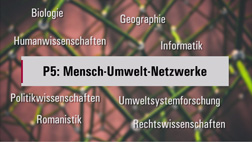Main content
Top content
P5: Human-environmental networks
Speakers
Prof. Dr. Claudia Pahl-Wostl
Institute of Environmental Systems Research
Prof. Dr. Martin Franz
Institute of Geography
Prof. Dr. Susanne Schlünder
Institute of Romance/Latin Studies
The human-environmental networks profile is intended to contribute to a breakthrough in the understanding of complex human-environment networks, thus providing the basis for meeting the central challenges of the present century. The focus is therefore on, for example, agriculture, soil and nutrition. The profile is based on a NEXUS approach to identifying the shortcomings of isolated approaches and the concomitant neglect of interactions, and to thereby overcome the resulting problematic system boundaries and sustainability deficiencies. A prime example is the water-energy food nexus.
The profile aims to develop innovative research approaches and projects at the interfaces between natural sciences, social sciences and the humanities. The initiative will develop interdisciplinary lectures and seminars, establish a regional platform, organize events on environmental and sustainability issues with other actors from science, business, politics and civil society (for example, the Osnabrück University of Applied Sciences and the German Federal Environmental Foundation) and initiate active participation in Future Earth networks.
Structure
More than 30 scientists from the natural sciences and humanities are involved in the profile. The disciplinary breadth of the researchers involved enables scientists to work on human-environment networks at interdisciplinary interfaces.
In order to promote interdisciplinary research on human-environmental networks which take account the objectives of the profile and interdisciplinary cooperation at Osnabrück University, the profile has a two-level structure:
- a lower level in which key thematic clusters are pursued within the bounds of the formulated objectives, and
- a higher level, which ensures the linking of the subtopics and the aggregation of the research results.
The following thematic clusters have been developed:
- Transformative learning - governance of sustainability transformations
- Problem awareness and governance: land use, land competition and soil protection
- Cultural Semantics of Social Change: Nexus and Narratives
- Ecosystem impacts: causes and consequences
The division into subtopics, on the one hand, results in different substantive aspects that correspond to the research activities and interests of the scientists involved so far. On the other hand, it is consistent with the successful acquisition of diverse third-party funds, which will be undertaken by small teams. The dual strategy will be pursued to promote distinct thematic access in all its diversity while at the same time supporting a profiling the entire research focus, i.e. initiatives for collaborative projects in the thematic clusters, in which several professorships / working groups are involved. In addition, integration and external communication of the entire profile are promoted through joint activities and publications.





